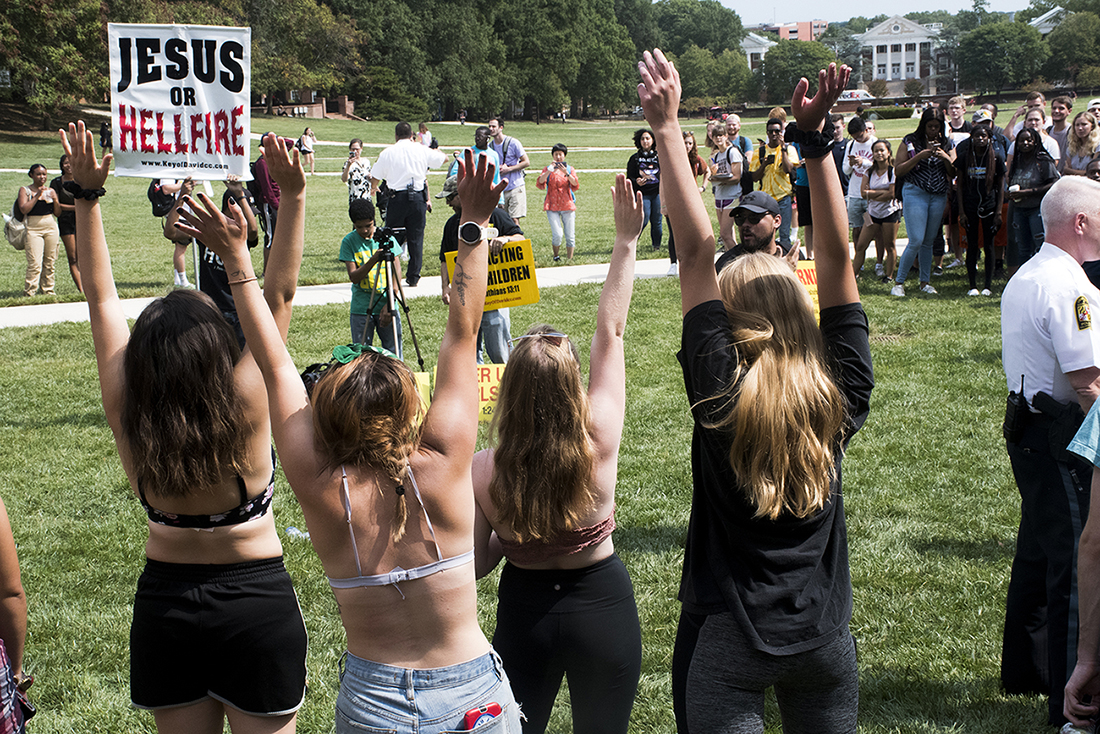Views expressed in opinion columns are the author’s own.
The Key of David counterprotests at the University of Maryland two weeks ago were a moment of campus unity, of organic relationships forming to defend shared values. And we should be remembering the moment for its radical solidarity and community-building, instead of gawking at the taboo nature of certain displays. It’s uncomfortable to see the strength of the protest later turned into spectacle, especially with regard to the women who took off their shirts. In the midst of other people stripping, kissing and other flashy shows of activism, their protest should’ve been just as part of the moment as the rest. Instead, it’s been singled out as something else.
The most flagrant example is Barstool Sports’ tweet of Catherine Oberfield flashing the Key of David demonstrators: a few seconds of the scene without context, obviously meant to net social media engagement through an exploitative shot. It’s a basic and easy form of entertainment, presenting an image you’re not supposed to see. But there’s such a lack of critical thought behind what the taboo is; they’re not just promoting an image of nudity, but also the exploitation of a college girl in the midst of rejecting a culture of shame, erasing her cause and making it a performance. It also encourages and seemingly makes no attempt to moderate a comment section full of misogynistic viewers voicing their own judgments and unnecessary opinions. She took off her shirt to be listened to, not to be made available for comment.
Still, other coverage of the event with extra focus on the stripping women promotes further reductionism. There’s no reason anyone on this campus should have the epithet, “the girl who took off her shirt.” It brings a loss of control when the act was meant to help women take power back from patriarchal attitudes. But it’s in this type of empty celebrity that the subject loses control over their image and identity, instead belonging to everyone. It happens to pop stars and politicians, but it’s so insidious to watch it happen to your peers on campus because they especially shouldn’t belong to any greater audience. They took action for themselves, and that’s not an invitation to let it define them.
Of course, a strong element of it is the taboo of female bodies. Even for a space as liberal as College Park, it’s an unexpected exposure. Rather than dwelling on its shock value, it’s an opportunity to show solidarity and expand our values. By accepting the display as part of the effectiveness of the protest, we’re accepting that women have breasts and that shouldn’t be a coded thing. When removed from context, when not accepted as part of the whole demonstration, it’s undermining this university’s collective action.
The Key of David group was so easy to rally against because of their dehumanizing rhetoric against marginalized communities. By countering in its own ways, this university’s community showed it wouldn’t stand by that. The extravagance of the displays were meant as shows of humanity — people kissing, singing, chanting obscenities and flaunting sex objects in aggressive enjoyment, mocking the demonstrators who say they should feel shame. Stripping should be as par for the course as anything else, recognized more for its radical vulnerability than for its entertainment value. A college protest is not a place for public comment, especially on participating bodies. It’s a space to listen. And what those women were saying was they wouldn’t stand to be silenced.
Hadron Chaudhary, opinion editor, is a senior English and geology major. They can be reached at chauds@umd.edu.



